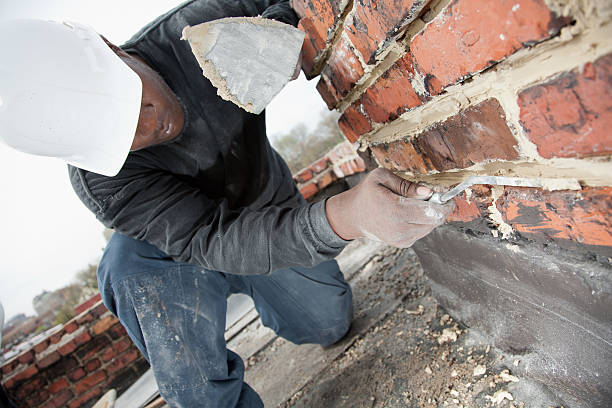Opening the Secrets of Lasting Stonework Building And Construction Practices for Eco-Friendly Structures
In the world of contemporary building, the quest of sustainable practices has become critical. Among the myriad techniques to environmentally friendly building, sustainable masonry construction stands apart as a reliable and sturdy approach that holds a wide range of untapped possibility. From the option of products to ingenious building techniques, the keys to accomplishing sustainability within stonework construction are complex and interesting. By discovering the benefits, materials, strategies, and future patterns of lasting masonry, a much deeper understanding of just how these practices can form the future of environment-friendly structures emerges.
Advantages of Sustainable Stonework Building
Embracing lasting masonry construction techniques not only reduces ecological impact yet likewise offers lasting economic advantages to home builders and communities. By using materials like recycled blocks, blocks, and rocks, contractors can significantly decrease the carbon impact of their jobs while advertising source performance. Additionally, lasting stonework building strategies, such as appropriate insulation and thermal mass residential properties, can enhance power performance within buildings, causing reduced operational prices over time.
Additionally, the durability and durability of stonework frameworks contribute to long-lasting financial advantages. Buildings built using sustainable stonework practices often require much less upkeep and repair work, equating to set you back savings for building contractors and homeowner. The longevity of masonry materials additionally ensures that structures continue to be secure and secure, decreasing the requirement for constant restorations or replacements.
Eco-Friendly Masonry Products
Making use of environmentally friendly stonework products is a crucial step towards improving the sustainability of building methods and reducing environmental impact while taking full advantage of long-lasting economic advantages. Lasting stonework materials are sourced, produced, and made use of in a fashion that minimizes general environmental impact. Materials such as recycled blocks, reclaimed stone, and lasting concrete blocks are coming to be significantly preferred options for eco-conscious builders. Recycled bricks, for example, not just divert waste from land fills but also call for less power to generate compared to brand-new blocks. Recovered stone offers an unique visual appeal while lowering the requirement for brand-new quarrying. Sustainable concrete obstructs include recycled accumulations and might feature better insulation residential properties, adding to power effectiveness in structures.
Furthermore, natural materials like adobe, rammed planet, and straw bundles provide outstanding thermal mass buildings, reducing the need for heating and cooling energy. These products are often locally available, promoting regional economies and minimizing transportation-related carbon emissions. By selecting environment-friendly masonry products, building and construction tasks can significantly lower their environmental impact and add to the production of much healthier, a lot more lasting developed settings.
Energy-Efficient Stonework Methods
Power effectiveness plays a critical duty in boosting the sustainability of masonry building methods. By executing energy-efficient masonry strategies, building contractors can dramatically Find Out More minimize the general power intake of a building, leading to reduced functional costs and a smaller sized environmental footprint. One essential energy-efficient masonry strategy is making use of thermal mass, which involves including dense products like concrete or brick into the structure's structure to soak up and keep heat. This aids control interior temperature levels, minimizing the demand for mechanical heating and cooling down systems.

Advancements in Sustainable Masonry
Current improvements in sustainable masonry practices have actually caused cutting-edge methods that are reshaping the building market. One such development is the growth of self-healing concrete, which uses bacteria installed within the concrete to heal cracks autonomously. This development not only reduces maintenance prices yet likewise enhances the longevity of stonework frameworks, adding to their sustainability.
Another significant development is using recycled aggregates in stonework construction - masonry contractor. By including materials such as smashed ceramic waste or recycled glass into concrete mixes, builders can minimize the environmental effect of building and construction jobs while keeping structural stability. This technique not only diverts waste from land fills but likewise preserves natural deposits, making it a crucial advancement in sustainable stonework building and construction
Furthermore, the combination of electronic layout tools, such as Building Info Modeling (BIM), is revolutionizing the method stonework frameworks are intended and constructed. BIM allows for more exact estimations, reduced material wastage, and enhanced power performance, ultimately resulting in more sustainable structure methods. These technologies jointly indicate a promising future for sustainable masonry construction in the read more age of eco-friendly buildings.
Future Trends in Masonry Sustainability
With the innovative strides made in sustainable masonry practices, the future trends in masonry sustainability are poised to further transform the construction market. One of the crucial fads forming the future of stonework sustainability is the raised assimilation of modern technology. Advancements such as Building Details Modeling (BIM) and digital fact simulations are being made use of to enhance masonry construction procedures, bring about minimized product waste and enhanced energy efficiency in buildings.
In addition, the growth of unique lasting materials is set to play a significant duty in improving the eco-friendliness of masonry construction. masonry contractor. Technologies like self-healing concrete, recycled accumulations, and bio-based binders are getting traction for their ability to minimize ecological effect while maintaining architectural stability

Conclusion
In final thought, sustainable stonework building methods provide various benefits for environmentally friendly buildings. masonry contractor. Innovations in lasting stonework learn the facts here now are continuously being developed to further boost the ecological performance of buildings.